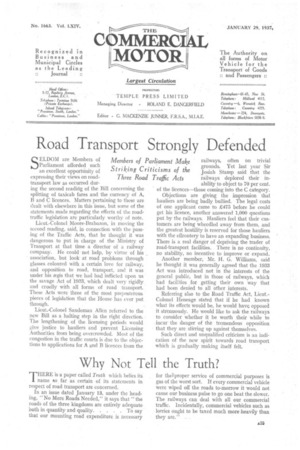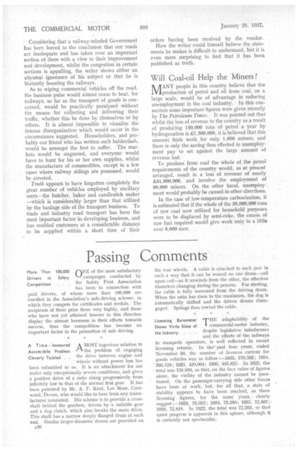Why Not Tell the Truth?
Page 27

Page 28

If you've noticed an error in this article please click here to report it so we can fix it.
THERE is a paper called Truth which belies its I name so far as certain of its statements in respect of road transport are concerned.
In an issue dated January 13, under the heading, "No More Roads Needed," it says that "the roads of the three kingdoms are entirely adequate both in quantity and quality To say that our mounting road expenditure is necessary for thei proper service of commercial purposes is gas of the worst sort. If every commercial vehicle were wiped off the roads to-morrow it would not cause our business pulse to go one beat the slower. The railways can deal with all our commercial traffic. Incidentally, commercial vehicles such as lorries ought to be taxed much more heavily than they are." Considering that a railway-minded Government has been forced to the conclusion that our roads are inadequate and has taken over an important section of them with a view to their improvement and development, whilst the congestion in certain sections is appalling, the writer shows either an abysmal ignorance of his subject or that he is blatantly boosting the railways.
As to wiping commercial vehicles off the road, the business pulse would almost cease to beat, for railways, so far as the transport of goods is concerned, would be practically paralysed without the means for collecting and delivering their traffic, whether this be done by themselves or by others. It is almost impossible to visualize the intense disorganization which would occur in the circumstance suggested. Householders, and probably our friend who has written such balderdash, would be amongst the first to suffer. The markets would be stagnated, and everyone would have to hunt for his or her own supplies, whilst the manufacture of commodities, except in a few cases where railway sidings are possessed, would be arrested.
Truth appears to have forgotten completely the great number of vehicles employed by ancillary users—the butcher, baker and candlestick maker —which is considerably larger than that utilized by the haulage side of the transport business. To trade and industry road transport has been the most important factor in developing business, and has enabled customers at a considerable distance to be supplied within a short time of their orders having been received by the vendor.
How the writer could himself believe the statements he makes is difficult to understand, but it is even more surprising to find that it has been published as truth.
Will Coal-oil Help the Miners?
A AANY people in this country believe that the 1 V Iproduction of petrol and oil from coal, on a large scale, would be of advantage in reducing unemployment in the coal industry. In this connection some important figures were given recently by The Petroleum Times. It was pointed out that whilst the loss of revenue to the country as a result of producing 150,000 tons of petrol a year by hydrogenation is £1,500,000, it is believed that this amount finds work for only 1,600 miners, and there is only the saving thus effected in unemployment pay to set against the large amount of revenue lost.
To produce from coal the whole of the petrol requirements of the country would, as at present arranged, result in a loss of revenue of nearly £41,000,000, and involve the employment of 60,000 miners. On the other hand, unemployment would probably be caused in other directions.
In the case of low-temperature carbonization, it is estimated that if the whole of the 35,000,000 tons of raw coal now utilized for household purposes were to be displaced by semi-coke, the excess of raw fuel required would give work only to a little over 6,000 men.




















































































